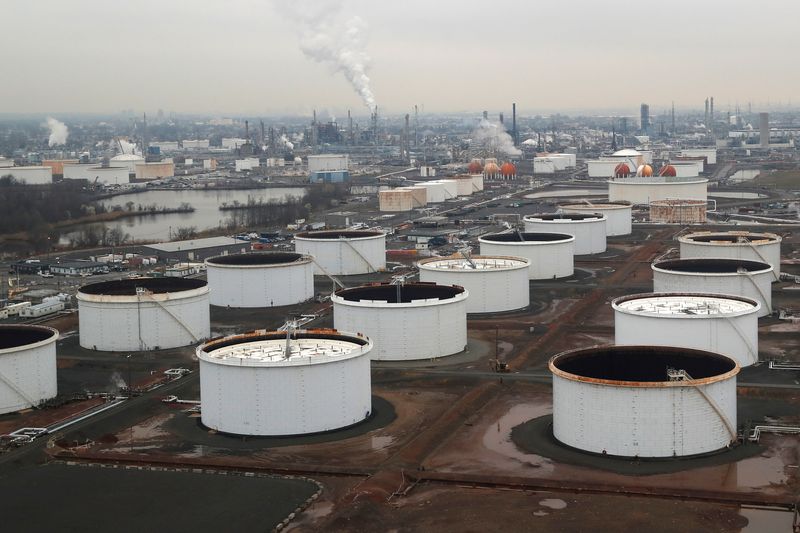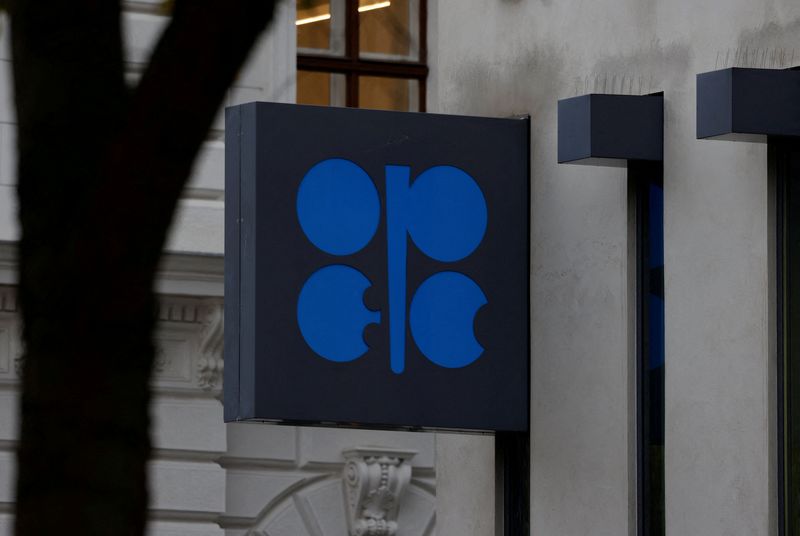Commodities
Oil slips after Iran plays down reported Israeli attack

By Noah Browning and Deep Kaushik Vakil
(Reuters) – Oil slipped on Friday following an earlier price spike of more than $3 after Iran played down reported Israeli attacks on its soil, in a sign that an escalation of hostilities in the Middle East might be avoided.
futures were down 48 cents, or 0.6%, at $86.63 a barrel by 1155 GMT. The most active U.S. West Texas Intermediate contract was down 38 cents, or 0.5%, to $82.35.
Explosions were heard in the Iranian city of Isfahan on Friday in what sources described as an Israeli attack, but Tehran played down the incident and indicated it had no plans for retaliation in a response that could ease concerns about escalation into a region-wide war.
Iran struck Israel with a barrage of drones and ballistic missiles on Saturday in retaliation for a presumed Israeli air strike on April 1 that destroyed a building in Iran’s embassy compound in Damascus and killed several top Iranian officers.
“Whilst the initial spike in oil may have highlighted the initial fear of further escalation, we have seen both equities and crude reverse some of those preliminary moves,” said Joshua Mahony, chief market analyst at Scope Markets.
“Events of the past week appear to be more about showing their willingness to act rather than actually seeking to incite a war …For markets this is a best case scenario”.
Investors had been closely monitoring Israel’s reaction to the April 13 Iranian drone attacks and have been gradually unwinding oil’s risk premium this week.
Prices have fallen more than 4% since Monday and are set for their biggest weekly loss since early February.
“The oil market is nonetheless concerned as there is too much oil supply at stake,” said Bjarne Schieldrop, commodities analyst at SEB Research.
Meanwhile, U.S. lawmakers have tucked sanctions on Iran’s oil exports into a pending Ukraine aid package which targets ships, ports or refineries that process Iranian crude and transactions from Chinese financial institutions involving purchases of petroleum from Iran.

Iran is the third largest oil producer in the Organization of the Petroleum Exporting Countries (OPEC), according to Reuters data.
The U.S. also announced sanctions this week on Iran targeting its unmanned aerial vehicle production.
Commodities
Oil prices rebound after closing at seven-week low

By Robert Harvey and Deep Kaushik Vakil
LONDON (Reuters) -Oil prices rose on Thursday, rebounding from three days of losses that took prices to their lowest since mid-March.
futures for July gained 58 cents, or 0.7%, to $84.02 a barrel by 1130 GMT. U.S. West Texas Intermediate (WTI) crude for June was up 47 cents, or 0.6%, at $79.47.
Prices fell more than 3% to a seven-week low on Wednesday after the U.S. Federal Reserve kept interest rates steady and warned of stubborn inflation, which could curtail economic growth this year and limit oil demand increases.
Crude was also pressured by an unexpected increase in inventories in data from the Energy Information Administration (EIA). Inventories were shown at their highest since June. [EIA/S]
Crude inventories rose by 7.3 million barrels to 460.9 million barrels in the week ended April 26, compared with the 1.1 million barrel draw expected by analysts in a Reuters poll.
While OPEC and its allies have yet to begin formal talks on extending voluntary oil output cuts beyond June, three sources from OPEC+ producers said such an extension could be agreed if demand fails to pick up.
“However, with 2025 oil balances looking in greater surplus due to non-OPEC+ supply growing faster than demand, we think OPEC+ should feel increasing pressure to unwind cuts going into next year,” Citi analysts said in a note late on Wednesday.
Supporting the price recovery was the potential for lower prices to spur U.S. government buying for strategic reserves.
remove ads
.
“The oil market was supported by speculation that if WTI falls below $79, the U.S. will move to build up its strategic reserves,” said Hiroyuki Kikukawa, president of NS Trading.
The U.S. has previously said it aims to replenish the Strategic Petroleum Reserve (SPR) after a historic sale from the emergency stockpile in 2022 and wants to buy back oil at $79 a barrel or less.
In the Middle East, meanwhile, expectations grew that a ceasefire agreement between Israel and Hamas could be in sight after a renewed push led by Egypt.
A deal on that front could take out some of the geopolitical risk premium that has buoyed oil prices in recent months, though Israeli Prime Minister Benjamin Netanyahu has vowed to proceed with a long-promised assault on the southern Gaza city of Rafah.
“The geopolitical temperature might have dropped a notch or two, but the climate remains hot,” said PVM analyst Tamas Varga.
Commodities
OPEC+ could extend oil cuts, formal talks yet to start, sources say

By Alex Lawler and Olesya Astakhova
LONDON/MOSCOW (Reuters) – OPEC and its allies have yet to begin formal talks on extending voluntary oil output cuts of 2.2 million barrels per day beyond June, but three sources from OPEC+ producers said they could keep their cuts if demand fails to pick up.
OPEC+ has implemented a series of output cuts since late 2022 amid rising output from the United States and other non-member producers, and worries over demand as major economies grapple with high interest rates.
OPEC+, which includes the Organization of the Petroleum Exporting Countries, Russia and other non-OPEC producers, next meets on June 1 in Vienna to set output policy. OPEC did not respond to a request for comment.
The OPEC+ group is currently cutting output by 5.86 million bpd, equal to about 5.7% of global demand. The cuts include 3.66 million bpd by OPEC+ members valid through to the end of 2024, and 2.2 million bpd of voluntary cuts by some members expiring at the end of June.
Oil prices have found support this year from the conflict in the Middle East, although concern about economic growth and high interest rates has weighed. hit a seven-week low on Wednesday and settled at $83.44 a barrel.
The three sources from countries which have made voluntary supply cuts said an extension was likely.
The cuts could be extended until year-end, said one source, while another said it would take a surprise jump in demand for OPEC+ to make any changes.
remove ads
.
Two other OPEC+ sources said formal talks had yet to take place, and one of those said OPEC+ was not yet leaning one way or the other on extending cuts.
The countries which have made voluntary cuts that are deeper than those agreed with the wider group are Algeria, Iraq, Kazakhstan, Kuwait, Oman, Russia, Saudi Arabia and the United Arab Emirates.
“We think there’s a good chance that OPEC+ will extend beyond June – but we aren’t yet putting a firm view because we don’t think they’ve actually got into the real period of discussion and decision-making,” said Richard Bronze of Energy Aspects.
Another option would be for some or all of the 2.2 million bpd of cuts to be unwound after June, analysts say.
OPEC has said it expects another year of relatively strong oil demand growth of 2.25 million bpd, while the International Energy Agency expects much slower growth of 1.2 million bpd.
Commodities
Oil prices rise on talk of extended OPEC+ supply cuts

Investing.com– Oil prices rose Thursday, recovering from near two-month lows, helped by talk of an extension of OPEC+ supply cuts.
At 08:20 ET (12:20 GMT), rose 1% to $84.28 a barrel, after hitting a seven-week low on Wednesday, while rose 0.9% to $79.73 a barrel.
OPEC+ to extend cuts?
OPEC and its allies could yet extend their voluntary oil output cuts of 2.2 million barrels per day beyond June, but Reuters reported Thursday, citing sources.
OPEC+, which includes the Organization of the Petroleum Exporting Countries, Russia and other non-OPEC producers, next meets at the start of June 1, and has yet to start formal talks, the news agency said, but the spurces indicated they could keep their cuts if demand fails to pick up.
The group has implemented a series of output cuts since late 2022 amid rising output from the United States and other non-member producers, and worries over demand as major economies grapple with high interest rates.
It is currently cutting output by 5.86 million barrels per day, equal to about 5.7% of global demand, but just over 2 million barrels per day of voluntary cuts by some members expire at the end of June.
Dollar drops as Fed downplays rate hike speculation
Oil prices were helped earlier Thursday by a drop in the dollar, with the greenback falling back from near six-month highs on Wednesday after Federal Reserve Chair Jerome Powell said the central bank’s next rate move will likely be a cut, although the timing of such a move remained uncertain.
remove ads
.
Crude, like many commodities, is priced in dollars, and thus a weaker greenback benefits crude demand by making oil cheaper for international buyers.
Oil prices battered by US inventories, production spike
Crude markets are on course for hefty losses this week, after official data on Wednesday showed U.S. grew a substantially bigger-than-expected 7.3 million barrels in the week to April 26. Gasoline stockpiles also grew, while distillates had a minimal draw.
The inventory reading, which was preceded by data showing U.S. production surged past 13 million barrels per day in March, ramped up bets that oil markets were not as tight as initially thought.
Such a scenario bodes poorly for oil prices.
Middling purchasing managers index readings from top importer China also weighed on oil prices this week.
Focus was also on ceasefire talks between Israel and Hamas, with any progress on that front lowering the risk premium attached to oil markets.
(Ambar Warrick contributed to this article.)

 Forex2 years ago
Forex2 years agoForex Today: the dollar is gaining strength amid gloomy sentiment at the start of the Fed’s week

 Forex2 years ago
Forex2 years agoHow is the Australian dollar doing today?

 Forex1 year ago
Forex1 year agoUnbiased review of Pocket Option broker

 Forex2 years ago
Forex2 years agoDollar to pound sterling exchange rate today: Pound plummeted to its lowest since 1985

 Cryptocurrency2 years ago
Cryptocurrency2 years agoWhat happened in the crypto market – current events today

 World2 years ago
World2 years agoWhy are modern video games an art form?

 Stock Markets2 years ago
Stock Markets2 years agoMorgan Stanley: bear market rally to continue

 Economy2 years ago
Economy2 years agoCrude oil tankers double in price due to EU anti-Russian sanctions

































